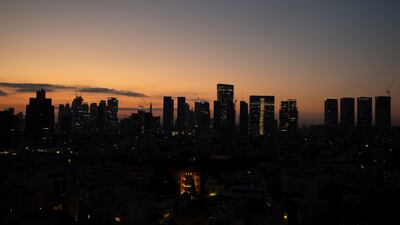Israel's economy grew less than expected in the second quarter of this year amid the volatility caused by the war in Gaza.
The country’s gross domestic product expanded by 1.2 per cent in the April-June period, the Central Bureau of Statistics said in an initial estimate on Sunday.
It was below the consensus forecast of 4.4 per cent and the 3 per cent growth estimate from the online platform Trading Economics.
On a per capita basis, Israel’s GDP fell 0.4 per cent in the quarter.
The overall growth was primarily driven by a rise in consumer spending by 12 per cent, investment in fixed assets by 1.1 per cent and government spending by 8.2 per cent, which offset an 8.3 per cent decline in exports.
Israel's economy grew at an annual rate of 2.5 per cent during the first half of this year, compared to 4.5 per cent during the same period last year, the data showed.
The war in Gaza began when Hamas attacked southern Israel on October 7, killing about 1,200 people and taking about 240 hostages.
Israel's retaliation has continued since then, with more than 40,000 Palestinians killed, 90 per cent of the enclave's 2.3 million people displaced and the economy of the Palestinian territories ravaged.
Calls for a ceasefire and hostage release deal have intensified amid fears Iran could launch a retaliatory strike against Israel at any moment following the assassinations of Hezbollah and Hamas leaders.
The likelihood of a full-scale regional conflict increased following the recent assassinations of Hamas leader Ismail Haniyeh in Tehran and senior Hezbollah military commander Fouad Shukr in Beirut.
Iran has threatened “harsh punishment” for Israel, which Tehran has blamed for the Hamas leader's killing.
Last week, Israel’s credit rating was downgraded by Fitch Ratings, which cited concerns around the continuing war and geopolitical risks.
Fitch maintained a negative outlook on the country's credit, indicating the possibility of a future downgrade, after lowering the credit rating from “A+” to “A.”
The agency has projected a budget deficit of 7.8 per cent of GDP in 2024 and expects debt to remain above 70 per cent of GDP in the medium term.
"In our view, the conflict in Gaza could last well into 2025 and there are risks of it broadening to other fronts," Fitch said.
"In addition to human losses, it could result in significant additional military spending, destruction of infrastructure and more sustained damage to economic activity and investment, leading to a further deterioration of Israel's credit metrics," the agency added.
In July, the Bank of Israel lowered the country’s growth forecast from its April projections due to the impact of the war in Gaza, noting that there is still a “long way to go” before the economy returns to normal.
The Israeli economy is expected to grow by 1.5 per cent this year and 4.2 per cent next year, with the central bank's projections cumulatively 1.3 percentage points lower than the April forecast.
In its earlier estimate, the Israeli banking regulator said the estimated cost of the conflict for the period between 2023 to 2025 stands at about 255 billion shekels or 13 per cent of the 2024 forecast GDP, which includes both higher defence and civilian spending, as well as lower tax revenue.
Last month, the International Monetary Fund cut its expansion forecast for Middle Eastern economies on the back of oil production caps and the Israel-Gaza war.
The world economy, which showed resilience last year, is in a “sticky spot” with the slowing pace of disinflation and prospects of a higher-for-longer interest rates regime looming large, the Washington-based fund said in the latest update of its World Economic Outlook.
The IMF maintained its global growth projection for this year at 3.2 per cent and expects the world economy to expand at a slightly faster pace of 3.3 per cent next year.






